The Master of Community Action & Social Impact empowers individuals to create meaningful social change through indigenous-led research methodologies and hands-on projects. Designed for those passionate about social justice, this flexible, part-time programme equips you with the skills and knowledge to lead impactful initiatives in your community. Start your journey towards making a real difference in Aotearoa today.
The Master of Community Action & Social Impact is a practical, research-driven Masters programme designed for those seeking to make a meaningful difference in their communities. The degree is grounded in Māori and Pasifika research methodologies and focuses on social justice, enabling candidates to positively impact Aotearoa (New Zealand) through research-informed skills and a real-world Social Impact Project.
This 180-point, 18-month part-time study programme is flexible – taught online and through wānanga – making it ideal for those balancing work and study. The programme is tailored for professionals in education, community work, public service, not-for-profit sectors, and anyone interested in social good.
The next intake for the Master of Community Action & Social Impact Programme will be in March 2026 – please note that applications for 2025 have closed.
-Applications Open: November 2025
-Applications Close: 5th February 2026
-Interviews: February – March 2026
-Start of Programme: Week beginning 11 March 2026
-Programme Completion: July 2027
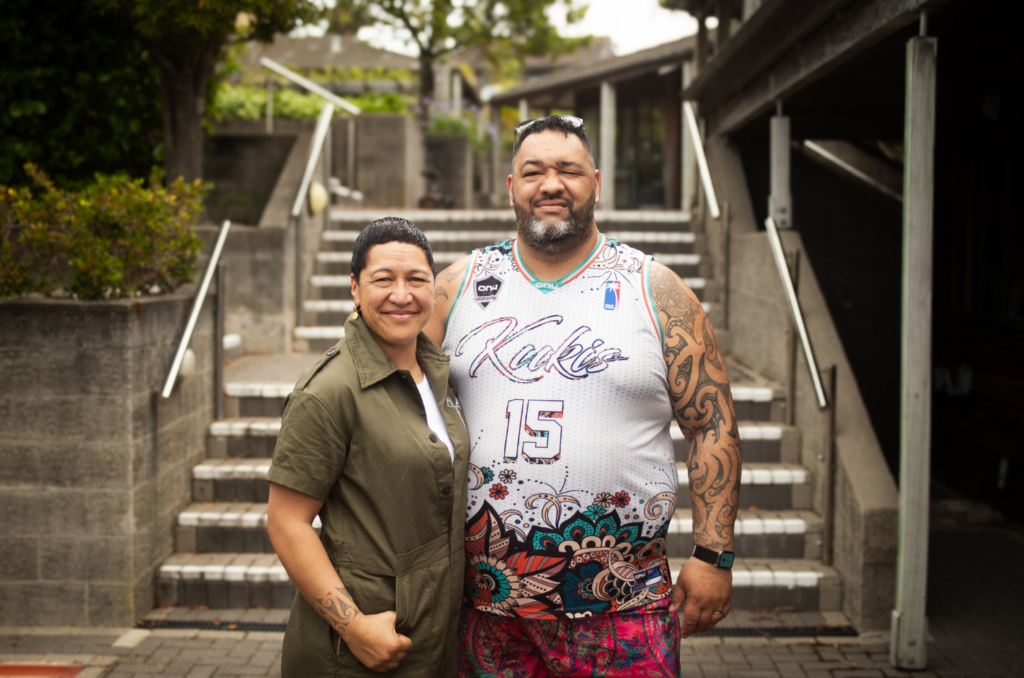

Dr Michelle Johansson
Michelle is a Tongan mother, theatre-maker and educator. Her work exists at the intersections between Education, the Performing Arts, and Social Justice; and one of the best parts of her multiple roles is delivering the Master of Community Action and Social Impact at Ako Mātātupu.
Michelle is an active researcher, committed to social justice. South Auckland, decile-one born and bred, she is proud to work alongside amazing teachers, warriors, storytellers and change-makers to re-story Pasifika in the largest Polynesian city in the world, to activate indigenous knowledges, to grow future leaders and to hold courageous spaces for our young people to walk tall in all of their worlds.
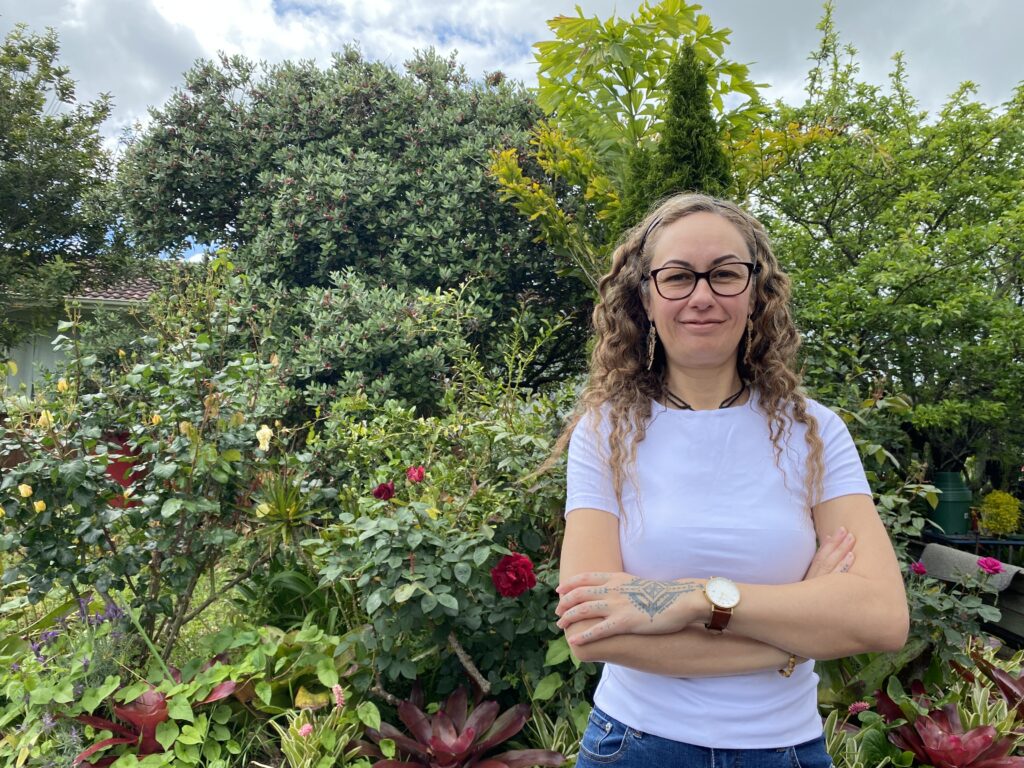
To be eligible for the Master of Community Action & Social Impact, you must:
This degree is for individuals who:
Apply your existing projects to your study, making a direct difference in your community. The programme is designed to give you hands-on experience in social impact, allowing you to create meaningful change while you learn.
Learn through indigenous-led research frameworks that honour Aotearoa's unique cultural heritage. This approach ensures that your projects are rooted in community values and social justice, creating sustainable change.
Receive personalised support from experienced mentors who are leaders in the fields of social justice, and community development. Our mentors will guide you through your Social Impact Project, offering valuable insights, feedback, and encouragement to help you succeed and make a meaningful impact.
Balance your career, studies, and personal life with the programme’s flexible, part-time study options. Designed for working professionals, this format allows you to pursue your academic and professional goals without compromising your commitments.
Focus on a Social Impact Project that you’ll develop in partnership with your community. This project is the core of your learning, offering a practical outlet to implement your research and make real-world change.
Join a supportive network of like-minded individuals who are equally committed to social justice and community transformation. Benefit from expert mentorship, peer collaboration, and a strong community of practice throughout the programme.
Submit your completed application form. Please click the Apply Now button below to start your application. We are looking forward to hearing from you.
If shortlisted, you will be invited to a Zoom interview where you’ll discuss your project idea, your connection to your community, and your goals for the programme.
After a successful interview, you’ll receive an offer to enrol, conditional on the submission of required documents, payment of fees, and police vetting (if applicable).
Meet some of our current masters students who are making a difference in their communities.
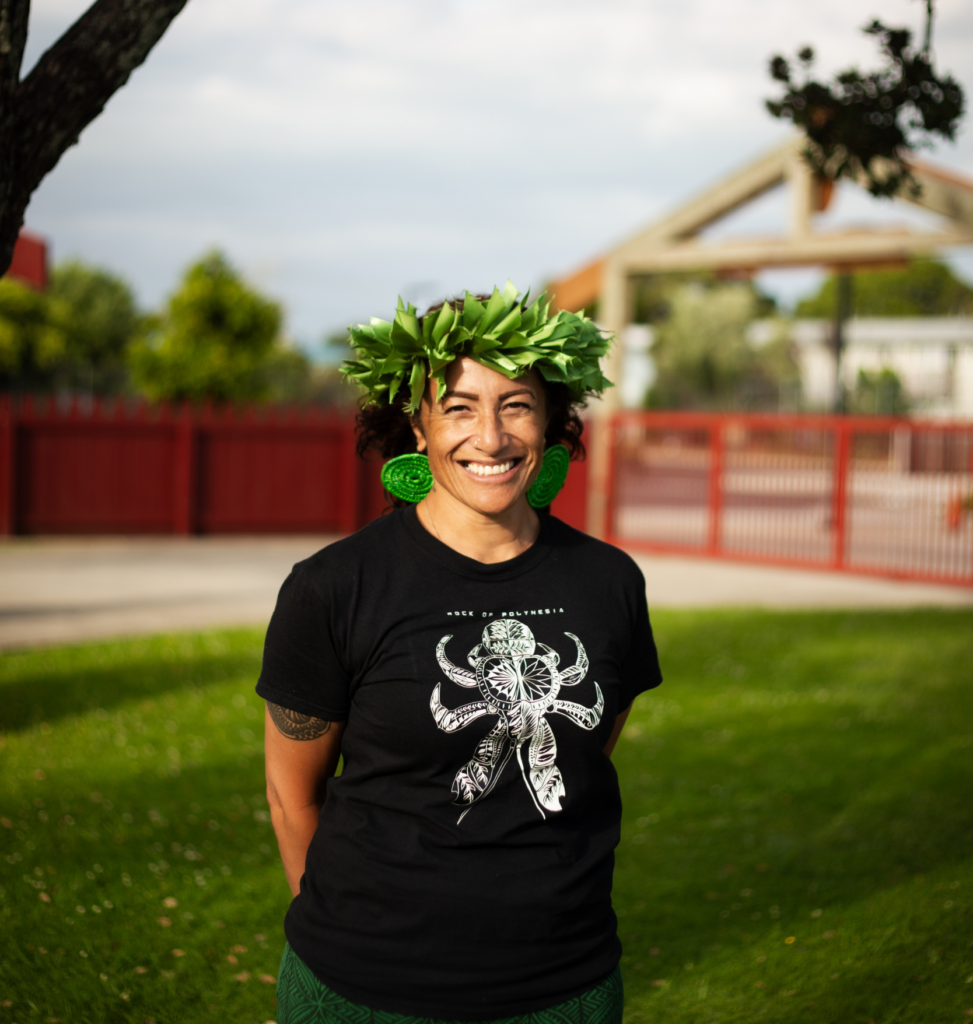
I want more for Maori & Pasifika tane who are over represented in New Zealand’s (justice) statistics. I want to use my walk, alongside vulnerable communities whilst working in the social services sector and whanau lived experience, to serve tane impacted by their relationships with prison.
The Masters of Community Action & Social Impact has provided a platform to sharpen my social justice lens with indigenous knowledge holders, build on my work in the trenches with those at the heart of this kaupapa and share my hopes with like minded peers, critical thinkers and dreamers. Being given the opportunity to delve deeper into the histories, politics and coal face realities, faced by those navigating predominantly pākeha systems of reintegration has broadened my understandings, and provided the necessary ‘next step’ for contributing to meaningful change. I want tane completing a sentence or rebuilding their home lives, to have a choice and a voice, to work with practitioners whom they can rely on for continuity of care who hold a commitment to navigating legal rigours whilst being bold enough to walk the edges of popular ethics and advocate for client agency. Culturally responsive and responsible pou, who are resolved to creating spaces where tane can rely on relational, whai ora centred, talanoa and tuakana teina informed support.
I want more for (our) Wayfinders & Warriors.

My journey into this kaupapa was profoundly personal and rooted; the conversation I had with my mother and aunty after they received their cancer diagnoses marked a significant turning point in my life. In that moment of vulnerability, their deep desire to reconnect with our whakapapa became a focal point. They expressed their wish for us to cultivate a strong understanding of our roots and to bring the whanau closer together, especially their children and cousins who had drifted away from our papa kainga.
This aspiration resonated deeply within me. I realised that our family’s legacy was about sharing our history and fostering a sense of belonging and identity for future generations. It was a call to action to actively preserve and promote our cultural knowledge. The master’s programme proved to be an invaluable support throughout my journey. It provided me with a comprehensive set of tools and frameworks that allowed me to delve deeply into our whakapapa, uncovering the rich narratives that have shaped our identity. I gained a nuanced understanding of the dynamics of cultural transmission, which is vital in preserving and sharing our heritage with future generations.
Additionally, the programme enabled me to develop effective strategies for engaging our broader family in meaningful ways, fostering a sense of connection and belonging among us. Drawing from the insights and guidance I received for my project, I channelled my passion for whakairo and mahi toi into a creative medium that resonates with our whānau. These traditional art forms became powerful tools for storytelling, allowing our family to express our unique narrative and cultural values. Through this process, I facilitated opportunities for our whānau to share their stories, celebrating our lineage and strengthening our ties as we collaborate to honour our past and envision our future together.
The impact of this project has been nothing short of transformative. As I looked around during our whanau wananga gatherings, I witnessed a profound change take place. The children, once distant and disengaged, began to embrace our stories with open hearts. Laughter and tears flowed freely, binding us together as we navigated the highs and lows of our whanau journey.
I could feel a renewed spirit among us, as if the simple act of revisiting our whakapapa infused our relationships with fresh energy and purpose. Our bonds, once frayed, grew stronger, creating a collective resilience that empowered us to rise above our individual struggles. I learned that each of us is a unique thread in a larger tapestry, intricately woven together by shared experiences and histories.
This project evolved into something much more significant than just documenting our family’s legacy; it became a powerful catalyst for healing, reconnection, and empowerment. As we continue this journey, I hold on to the unwavering belief that our whakapapa will serve as a guiding light, uniting us not just in the face of today’s challenges but also for generations to come. Together, we are crafting a narrative of strength, unity, and hope that will inspire those who follow in our footsteps.
I gained a unique perspective as a Kairapu and a staff member involved in this initiative. My dual role allowed me to observe firsthand the healing power of culture and connection. Witnessing how my whānau members, particularly my mother and aunty, found solace and joy in sharing their own stories was transformative. It reshaped my understanding of the intergenerational bonds formed through storytelling and remembrance. I learned that our shared identity carries a profound sense of hope and love, even in times of hardship.

The course has deepened my understanding of the context I am working in, and provided me with research and rangahau that is relevant to my community and the project we are designing. The community of care provided to candidates, catering to individual needs has been game changing. The programme has been delivered with flexibility in mind, with on-line sessions and in-person wānanga that have supported us to journey together as a cohort, learning from one another, and creating a family-like environment. This has been by far the best experience I have had in formal education and would unreservedly recommend this opportunity to anyone looking to complete a Masters programme.
I found our first semester, where we looked into our positionality in relation to Te Tiriti o Waitangi and social justice movements both locally and internationally have been challenging and rewarding in equal measure. These formal “delivered” learnings have been enhanced through the discussions within our cohort. My fellow candidates have also been an invaluable support through the programme. I have deeply valued the diverse experiences and perspectives they have shared.
I hope that as a result of my Masters project our community will continue to grow together, learn from each other and realise our aspirations of a fairer Aotearoa New Zealand for all young people.
Download our comprehensive Info Pack to learn more about the Teach First NZ Programme.
The Info Pack includes everything you need to know about our mission, programme structure, eligibility criteria, and how you can make a difference.
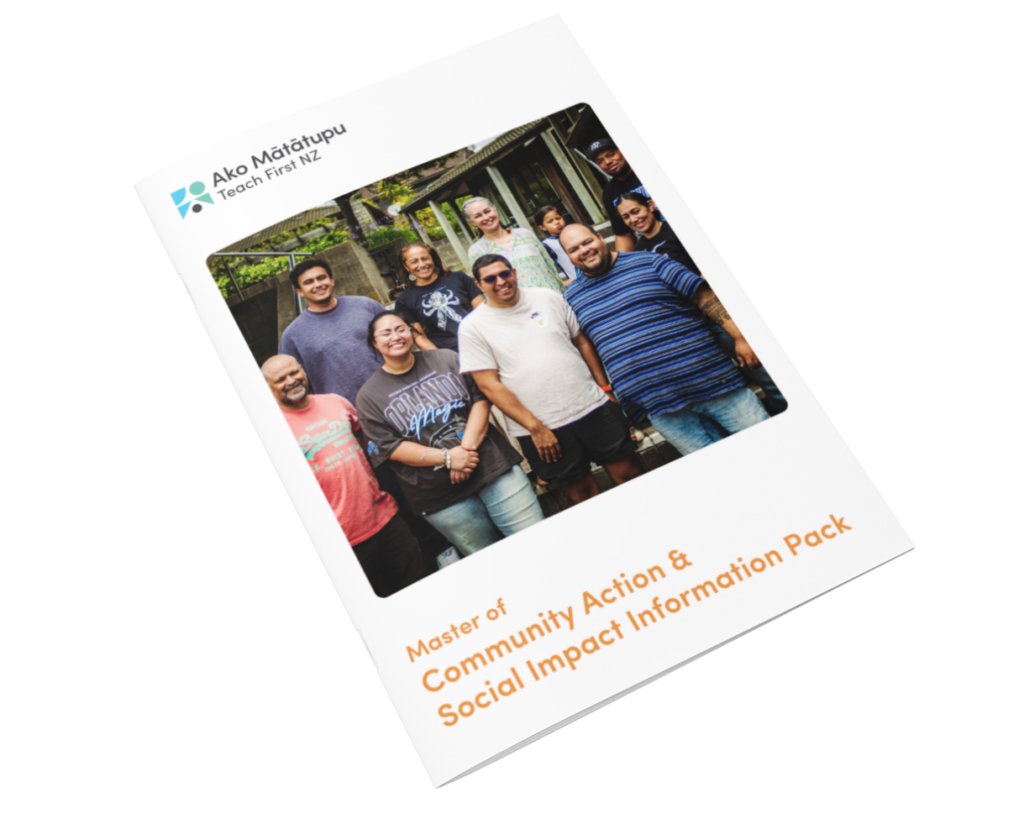
The Master of Community Action & Social Impact is an 18-month, part-time programme designed for individuals who want to create meaningful social change. It combines practical learning with indigenous-led research methodologies, empowering students to lead Social Impact Projects within their communities.
The programme is delivered part-time over 18 months, allowing you to balance work and study. It includes coursework focused on social justice and indigenous research methodologies, with a key component being the implementation of a hands-on Social Impact Project within your community.
The Social Impact Project is the heart of the programme. You will identify a community issue and develop a project to address it, working closely with community members. This project is integrated into your studies, allowing you to apply what you learn in real-time.
Indigenous-led research methodologies centre on indigenous knowledge systems, values, and worldviews. These approaches promote community-driven solutions and ensure your work is culturally responsive, ethical, and focused on social justice.
Yes, the Master of Community Action & Social Impact is an NZQA-accredited qualification. This ensures the programme is recognised and valued within New Zealand and internationally.
Yes, the programme is designed for working professionals. It is delivered part-time, allowing you to balance your career and other responsibilities while studying. The structure is flexible to accommodate your work schedule and personal commitments.
To apply, you need to complete the application form, submit your CV, and record a short video discussing your Social Impact Project idea. If shortlisted, you will be invited for an interview. After the interview, selected candidates will be invited to complete the full enrolment process.
The programme fees for domestic students are $8,000 (+GST), additional costs may apply for course materials and other requirements.
No, you don’t have to be based in Auckland to do this programme. Weekly classes are held online via Zoom on a weekday evening, from 7–9pm. However, we do have a handful of in-person wānanga based in Auckland throughout the programme. We have had students from out of Auckland before, if this will likely be a barrier we encourage you to get in touch.
To be eligible, you must have experience in social justice work, currently work in an education or community context, and hold a Bachelor’s degree or equivalent. You also need to submit a Social Impact Project idea to develop in partnership with your community.
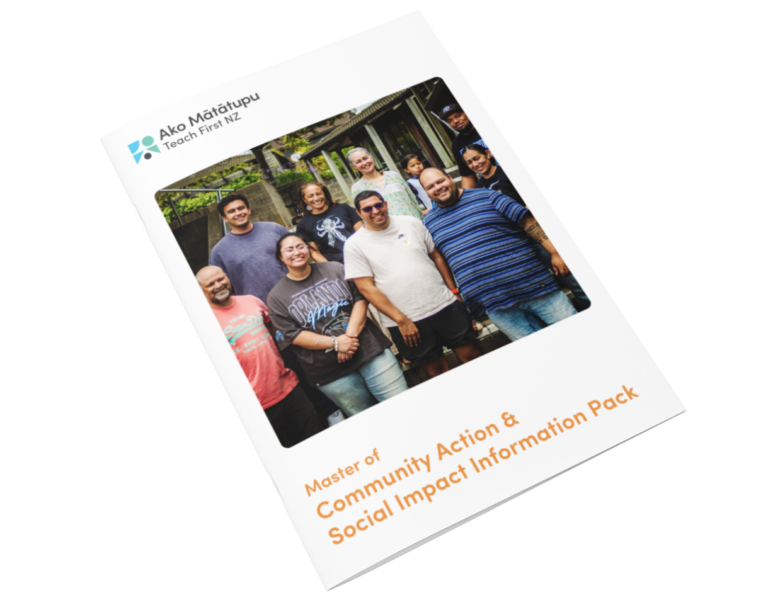
Fill out your details below and we will send the masters info pack to your email.